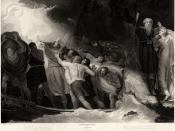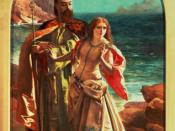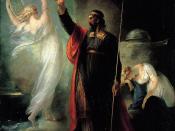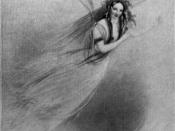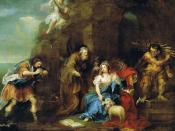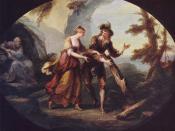Shakespeare's "The Tempest" is a play about a man named Prospero, once the Duke of Milan, who was usurped by his younger brother, Antonio, with the help of Alonso, the king of Naples. He was left on the sea with his baby daughter, Miranda, to die but luckily he survives on an island. By some force of fate, a ship containing his traitors is nearby. Prospero uses magic, whose study cost him his dukedom, to cause a tempest and to bring the traitors on land, making them think they have been shipwrecked. He then begins to dish out his punishment. In this scene, Prospero continues his punishment as Antonio and his entourage take a rest from looking for his son, Ferdinand, whom they now believe is drowned.
In this scene, Alonso is sad because he has finally decided to come to terms with what he think is reality; that Ferdinand had droned.
He says, "⦠he is drowned, whom thus we stray to find, and the sea mocks our frustrate search on land. Well, let him go". The description of their futile search as "frustrate" could mean that the fruitlessness of their search makes him frustrated. His comment on the mocking of the sea, shows that he is in despair for the sea looked on as they searched on land, knowing(the sea) very well that it(the sea) had taken Ferdinand. With this tone and these comments, Antonio creates a mood of sorrow and sympathy for himself, those with him, as well as the audience.
The evil attitude of Antonio and Sebastian is also revealed in this scene. While Alonso and the others are sad because of the loss of Ferdinand, Antonio and Sebastian rejoice at this news. They plan to kill Alonso and the others and make Sebastian king of Naples since he is next of kin. Antonio also plans secretly to kill Sebastian after their plan has been carried out and make himself king. Antonio says, "I am glad that he (Alonso) is so out of hope." And Sebastian says, "Let it (the plan) be to-night for now they (Alonso and the rest) are oppressed with travel". Their lack of the slightest sympathy reveals their evil character.
Also in this scene, strange figures appear with a banquet, inviting Alonso and the others to come and eat. Alonso and the others are so marveled at the figures, particularly at their gentle actions of salutation, that they are speechless for a while. Sebastian says, "â¦now I will believe that there are unicorns, that in Arabia there is one tree, and on the phoenix throne, one phoenix at this hour reigning there". In an attempt to show how marveled he was, he exaggerates- unicorns are myths and there is more than on tree in Arabia. The other men are equally marveled at these creatures they do not know and cannot seem to pin a name to them; only "islanders"As the men continue to comment on the actions of the islanders, Prospero, who is controlling all these events, stands else where invisible to them, and runs a commentary on their comments. When Gonzalo says, "â¦their manners are more gentle-kind than of our human generation; you shall not find many, nay, almost any", Prospero says, "Honest lad, thou hast said it well; for some of you there present are more than devils". In effect he refers to Alonso and Antonio and Sebastian and all their wicked schemes. Prospero also gives orders as to what the spirits are to do, for when he says' "praise in departing", they vanish, still with their actions of salutation. Also, after Ariel has given his speech, he praises Ariel for following his instructions and making his plan work. Therefore in this scene he plays the silent, invisible observer, looking on as the others suffered his plans.
Prospero also gives out another punishment to Alonso and his men. These men are tired and starving from their long search for Ferdinand and suddenly, food deserving people from the king's court appears from nowhere. At first, they are not sure what to do. Sebastian asks, "will it please you taste what is here?" and Alonso answers, "Not I" but thinking of their empty stomachs, they decided to eat. Alonso who initially said he will not eat now says, "I will stand to feedâ¦.brother, my lord the duke, stand to and do as we". It is at this moment that Prospero decides to make the food vanish from the sight of the hungry men.
The last part of this scene serves as a climax of the play. For ten years on the island, Prospero has longed to make his traitors come to terms with their sins. Also, all this while, Alonso and his men have encountered many troubles and finally they begin to understand why. Ariel tells these men that their evil deeds have earned them these punishments. He calls them "men of sin and says that "the never-surfeited sea hath cause to belch up you" meaning that even the sea that is never satisfied has thrown them up (from its belly; metaphorically) because they are sinful. He tells them that unless they truly repent of their sins, they will forever stay on the island with nothing but hearts full of sorrow.
This scene being the peak of the play is therefore very important, as many things which have kept the audience in suspense, and the other characters anxious, has been brought out in the open. This makes it relevant as the reason for all the other events has been revealed and signals to the audience that the play would soon end, as after the climax there is the falling action then the resolution, where the play ends.
BIBLIOGRAPPY"THE TEMPEST" BY WILLIAM SHAKESPEAREUBSPD MODERN SHAKESPEARE SERIES
